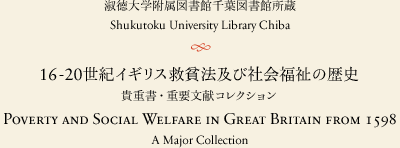 |
 |
 |
 |
1834
THE REPORT OF THE COMMISSIONERS |
133. [CHADWICK, EDWIN AND SENIOR NASSAU W.] Commissioners for inquiring into the administration and practical operation of the Poor Laws (1832-34) Report. London: Published by Authority. B. Fellows. 1834. 362p + 128p. Original beige printed cloth, expertly recased, crisp and clean internally.
When in 1834 the Commission published its General Report the whole of the governing class of the period was prepared for its sweeping conclusions. This General Report of the nine commissioners was unanimous. It seems however that it was almost entirely the work of Edwin Chadwick and Nassau W. Senior. Chadwick is thought to have been responsible for devising the remedial measures necessary. He was by and large the originator of the ideas and project but Senior was of superior judgement and to him fell the task of digesting and presenting the material. Three-quarters of the whole work was written by him and what he did not write he heavily revised or re-expressed.
This report of 1834 not only determined for seventy years the acknowledged policy of the English Parliament and the English Cabinet with regard to the relief of destitution, but also established, for the first time in Great Britain, a new form of government which was destined to spread to other services, namely the combination of a specialized central department exercising executive control but not itself administering, with a network of elected Local Authorities covering the whole kingdom, each carrying out within the limits of that control, the very large powers entrusted to it by Parliamentary statutes.
The most important change recommended by the Commission and embodied in the Act was the removal of out-door relief to the able-bodied. The great groundswell of opinion which led up to the Act had been dominated by the single idea of the need to eliminate pauperism. This was now achieved by the introduction of the “Workhouse Test”. By this device the option placed before the lower classes was either seek a job and work, or enter a Workhouse of often grim and strict regime, where alone support from the poor rate would be given. It was apparently Chadwick who pressed on the Commission the “workhouse system” as a solution to the problem of pauperism. “By the workhouse system”, Chadwick tells us, “is meant having all relief through the workhouse, making this workhouse an uninviting place of wholesome restraint, preventing any of its inmates from going out or receiving visitors, without a written order to that effect from one of the Overseas: disallowing beer and tobacco etc.” The idea was to keep the poor hard at work in the workhouse under such conditions that, though no man really in want would hesitate to comply with them, yet any who had any other option would not wish to remain.
See Webbs English Poor Law History. The Last Hundred Years. P.56-67.
|
 |
|
 |
 |
 |
 |
|



